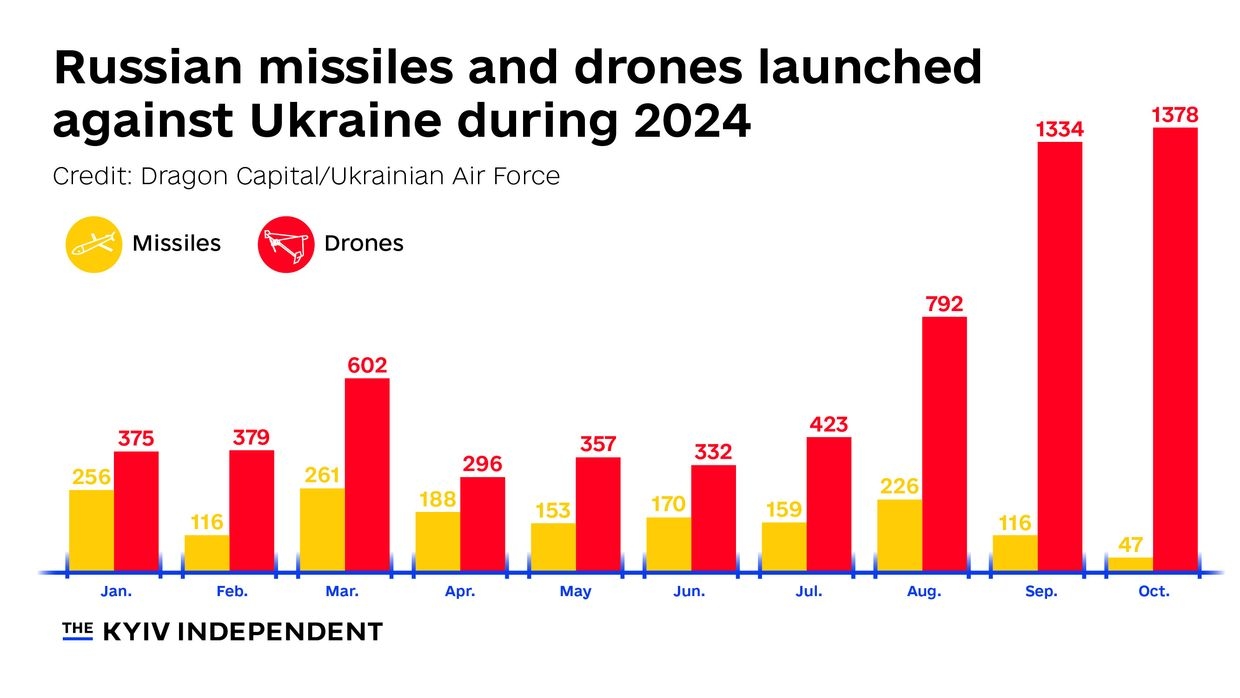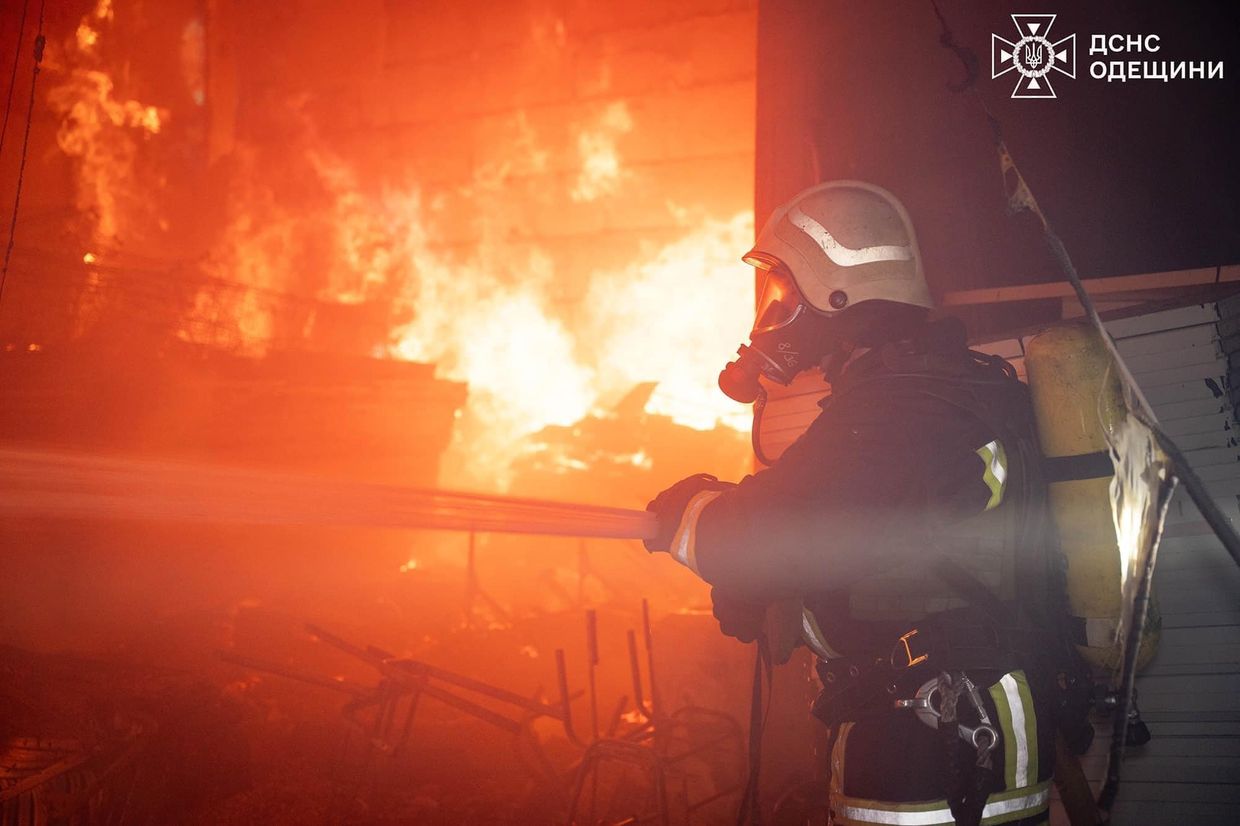As drone strikes surge, Russia's next mass missile attack on Kyiv likely imminent, experts and weary residents say

A residential building on fire after a Russian drone attack in Kyiv, Ukraine on Oct. 25, 2024. (Yan Dobronosov/Global Images Ukraine via Getty Images)
Russia's aerial attacks against Kyiv have changed dramatically in recent weeks, becoming far more frequent yet far less destructive.
Moscow has ramped up drone strikes on the capital — which overnight on Oct. 31 was attacked for the 20th time this month — and the rest of the country, while dialing down the use of more powerful and harder-to-intercept cruise and ballistic missiles.
The last combined mass missile and drone attack on Kyiv was nearly two months ago. While on the surface, this may seem like a positive development, for the capital's residents, it is stirring up a sense of unease.
"I think this is a target practice before winter," 32-year-old Kyiv school teacher Zakhar Shevchuk told the Kyiv Independent
"I think there will be missiles, drones — everything combined because there have been no missiles for a long time, but there are a lot of drones."


Ukrainian officials have for months been warning of a renewed effort by Russia to destroy the country's energy infrastructure after a series of devastating strikes between March and August of this year severely damaged many of the country’s thermal power plants, and grid connection of generation from hydroelectricity producers.
The country, as a result, is heavily dependent on power produced by nuclear power plants as well as imports.
"The winter will be the hardest of the last three years," the interim head of Ukraine's state grid operator Ukrenergo, Oleksiy Brekht, said in an interview with Suspilne on Oct. 29.
He added that if Russia continues its onslaught of attacks against critical energy infrastructure as it did last winter, then Ukrainians may face up to eight hours of power outages on the most "critical" days.
Chance of a deal?
According to a report by the Financial Times (FT), Kyiv and Moscow are holding preliminary discussions about stopping attacks on each other's energy infrastructure after earlier talks fell through following Ukraine’s incursion into Russia’s Kursk Oblast.
A senior Ukrainian official cited in the report said energy infrastructure attacks have already decreased in the past few weeks, based on a deal established through Ukraine and Russia’s respective intelligence agencies.
Moscow has denied the reports of negotiations.

Liubov Bondar, 75, a retired worker at a maritime shipping company, told the Kyiv Independent that even if the negotiation reports were accurate, they would not be effective.
"Can we really trust (Russian President Vladimir) Putin?" she asked, adding: "He doesn't like the fact that our guys are hitting oil refineries.
"I don't believe him — whatever he says, he will lie.”
Surging drone strikes
While the number of missiles Russia has launched against Ukraine has dropped dramatically since the last mass attack on Sept. 2, the number of kamikaze drones has surged to unprecedented levels.
September was the first month since the start of the full-scale invasion that Ukraine was attacked by Shahed-type drones every single day, with more than 1,300 being launched.
This has only escalated during October, with the month's total surpassing September on Oct. 23. The vast majority are shot down, with some others being jammed by electronic warfare.

"The attacks have increased. It’s bad, but it is what it is," said 44-year-old Olena Syrotina, who has lived in Kyiv since 2015 when she was forced to flee Luhansk after Russia's 2014 invasion of Ukraine.
"Now I can even hear (the drone’s) buzz in my apartment. Before this month, it had never happened.
"I sleep, but when air defenses are shooting, and the light flashes in my windows, I wake up and go to the corridor."
Syrotina is right to be cautious — two people, including a 15-year-old girl, have been killed in the capital in recent days.
"I sleep, but when air defenses are shooting, and the light flashes in my windows, I wake up and go to the corridor."
Though drones have inflicted far less damage than some of Russia's mass missile strikes, experts who spoke to the Kyiv Independent said this may well be in preparation for an unprecedented mass attack rather than any sort of restraint from the Kremlin.
"UAVs (Unmanned Aerial Vehicles/drones) can be used as pathfinders,” Sidharth Kaushal, a senior research fellow at the Royal United Service Institute (RUSI), told the Kyiv Independent.
"A tool to force (an air defense) radar to light up, allowing the Russians to map the layout of defenses around Kyiv and other fairly well-defended cities."
Kaushal and other experts warn that Moscow's reliance on drones over missiles is likely a sign of a particularly large aerial attack in the near future.
"It's been quite a while since we saw a large-scale missile strike, which worries me," Fabian Hoffmann, a defense expert and doctoral research fellow at the University of Oslo, told the Kyiv Independent.
"Part of this could relate to the fact they are ramping up not just for one or two mass strikes, but perhaps several more with the objective of fully disintegrating Ukraine's electrical grid within a short period of time," he said.
"It could also be to allow for comprehensive follow-on attacks after initial blows have been dealt to make sure it cannot be effectively repaired."
What will Russia target?
Oleksandr Kharchenko, the managing director of the Energy Industry Research (EIR) Center, told the Kyiv Independent that making any predictions about Russia's next mass missile attack on Ukraine's energy infrastructure is virtually impossible.
"We can't say for sure what objects will be attacked, how it will be attacked, or how effective the air defenses will be in this situation," he said.
But he added that attacks on Ukraine's energy generation would have a more significant impact than attacks on the country's power grid.
Last month in New York, President Volodymyr Zelensky told the U.N. Security Council that Russia was preparing to target three Ukrainian nuclear power plants.
A few days earlier, Ukraine's Foreign Minister Andrii Sybiha said Russia's possible targets include open distribution devices at nuclear power plants and transmission substations "which are essential for the safe functioning of the nuclear energy system."
According to Kharchenko, an attack on Ukraine's nuclear sites would lead to a "very, very complicated situation."

There are three operating nuclear power plants on the Ukrainian-held territory — Rivne and Khmelnytskyi NPPs in the country's west, and Pivdennoukrainsk NPP in the south. Kharchenko said they account for "55-60% of electricity consumption."
"If a nuclear station's switchyard was attacked, damaged, or destroyed, it would be very painful," he said.
"And if you lose even one station from the grid, it means that you have lost it for three or four weeks because restoring the switchyards takes this long to repair."
When will it happen?
Guessing when the next big attack will occur is currently a pastime of experts and citizens in the capital.
"Well, first of all, you have to ask the Russians because they are absolutely out of common sense logic," Kharchenko said when asked when he thinks it might be.
Several Telegram channels monitor the activities of Russian bomber aircraft based at airbases used to attack Ukraine.
One of the latest reports noted a significant number massing at various airbases, adding to speculation in Kyiv of a possible imminent attack, but still with no clear conclusions.
"I watch the news, I watch different analysts (to hear) their predictions because no one fully knows what's in (the Russians') heads," said Shevchuk, the Kyiv school teacher.
Weather forecasts are also closely followed because, as Karchenko explains, attacking Ukraine's energy infrastructure when the temperatures drop would likely cause more damage and more detrimental effects to the country’s economic stability and war efforts.
"It's absolutely possible that they're really waiting for freezing cold temperatures," he said. Increased demand in colder weather would place much more significant strain on a damaged system, leading to more blackouts and restrictions, according to Kharchenko.
"It's absolutely possible that they're really waiting for freezing cold temperatures."
"It's also more complicated to repair something when you have freezing temperatures," he added.
All that is left for Kyiv's residents is to prepare as best they can. Large generators have appeared on streets all over Kyiv as shops, restaurants, and bars take measures to ensure they can stay open during blackouts. Countless smaller systems have appeared in homes across the capital.
"I'm expecting blackouts," 28-year-old Alina Malynovska told the Kyiv Independent. "I have a battery and an inverter. It's like a home charging station for everything."
But some Ukrainians see advantages to power cuts in colder weather.
"In winter, it will be a little better because we can keep food on the balcony," Bondar, the pensioner, said. "(In summer) the food was spoiling in the refrigerator."
Despite the trepidation about the upcoming winter, those living in Kyiv have grimly experienced such hardships.
"Somehow I lived through last winter," 45-year-old Yurii told the Kyiv Independent, adding: "We’ll survive this one too."














